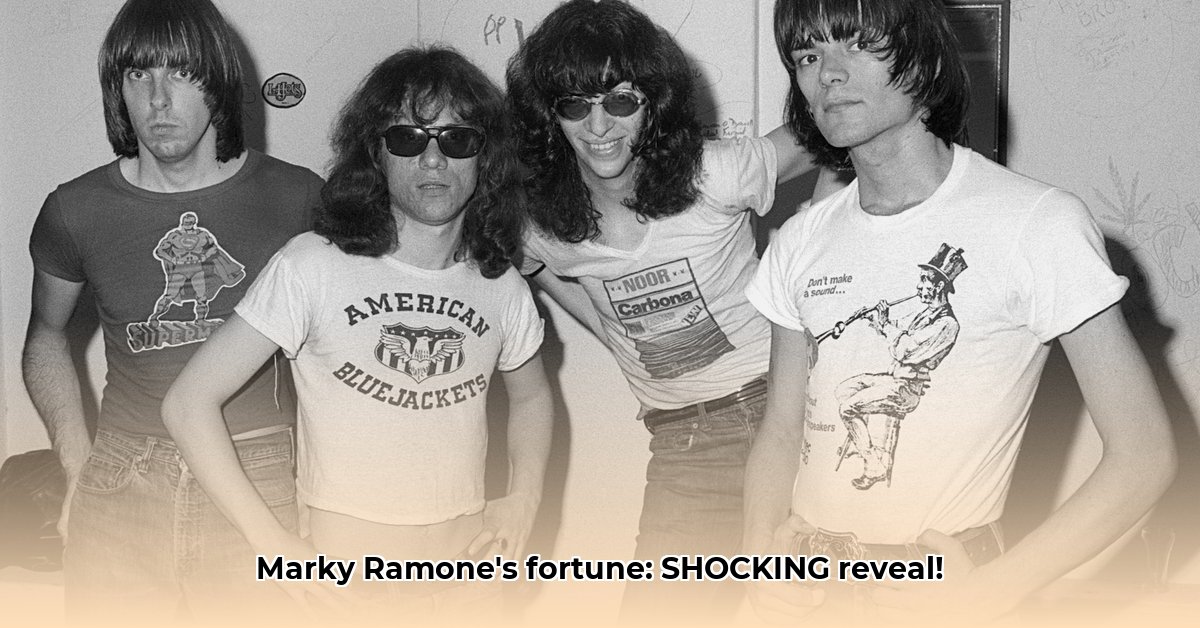
Unmasking the Punk Legend's Fortune
Marky Ramone, the iconic drummer of the Ramones, a band that redefined punk rock, left an undeniable mark on music history. But how much is the man himself worth? Estimates of Marky Ramone's net worth vary wildly, ranging from a modest $2 million to a substantial $12 million. This discrepancy isn't simply a matter of inaccurate reporting; it reflects the complexities of celebrity finances and the unique entrepreneurial spirit of the man himself. This article delves into the financial story of Marky Ramone, exploring the factors contributing to his wealth and highlighting the challenges in definitively determining a precise figure. For comparison, check out Bobby Rydell's net worth.
Beyond the Blitzkrieg Bop: Building a Fortune Brick by Brick
The Ramones' influence on music is undeniable. Their raw energy and iconic sound launched a thousand bands. But translating that legendary status into a concrete net worth is a challenge. While their extensive touring and record sales undeniably contributed significantly to Marky's wealth, it's his post-Ramones entrepreneurial ventures that significantly boosted his financial standing.
Marky didn't simply rest on his Ramones laurels. He actively diversified his income streams—a feat many musicians struggle to achieve. He successfully transitioned into DJing, launched his own clothing line, and even created a surprisingly successful line of pasta sauce! This entrepreneurial drive and shrewd business acumen are critical in understanding the wide range of net worth estimates. It suggests his fortune is not solely built on past musical achievements but on a continuously evolving career built on multiple, diverse revenue streams. Isn't that a testament to his grit and business savvy?
Comparing the Ramones' Riches: A Punk Rock Financial Landscape
The financial stories of the other Ramones also reveal significant disparities. While some sources report Johnny Ramone amassed a considerable fortune, reports suggest Dee Dee and C.J. Ramone's estates held significantly less. This disparity raises questions about the band's internal financial structure. Were earnings divided equally? What types of contracts were in place? Further research into these areas is crucial for understanding the economic realities behind the band's immense success. There's likely more to the story than simply record sales and touring income.
The Numbers Game: Why Precision Remains Elusive
The lack of precise financial data for musicians like Marky Ramone is commonplace. Privacy concerns, coupled with the complex accounting practices within the music industry, make obtaining definitive numbers incredibly difficult. Much of the available information is based on interviews, estimations, and educated guesses. This doesn't mean these figures are entirely unreliable; rather, it emphasizes the need for caution. Think of these financial estimations as educated approximations, snapshots of a far more intricate financial narrative.
Unlocking the Future: Further Research into Punk Rock Finances
There's a significant opportunity for further research into the financial lives of Marky Ramone and other iconic punk bands. Imagine the insights we could gain by accessing financial records, interviewing key players, and analyzing the distribution of royalties and touring profits! Such investigations would benefit not only music fans and historians but future music business students and professionals, potentially revealing surprising patterns and the inherent complexities of finances within rock and roll.
Actionable Insights: Deciphering the Ramones' Financial Dynamics
To gain a clearer picture of Marky Ramone's net worth and the overall financial landscape of the Ramones, we need to investigate several key areas:
Revenue Sharing: How were earnings from records, tours, and merchandise allocated among band members? Were contracts fair, or did certain members receive a larger share? Understanding this is critical to see the true picture of the income split.
Post-Band Ventures: What was the financial contribution of Marky's endeavors outside the Ramones? Can these ventures serve as a model for other musicians seeking financial security beyond their musical careers? Clearly his entrepreneurial spirit shows here.
Merchandise Sales: What was the band's revenue from merchandise? Was the profit distributed fairly, or did some members benefit more than others? Examining this will help to form a complete overview of the band's financial welfare.
Licensing Deals: How profitable were the licensing of the Ramones' music and imagery? Licensing agreements are often significant income streams for artists, and examining the Ramones' agreements could offer critical insight.
By exploring these points, we can potentially achieve a more accurate estimation of Marky Ramone's net worth and gain valuable insight into the financial dynamics of one of punk's most influential bands. The Ramones’ financial journey is complex and still being revealed.